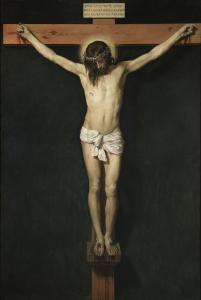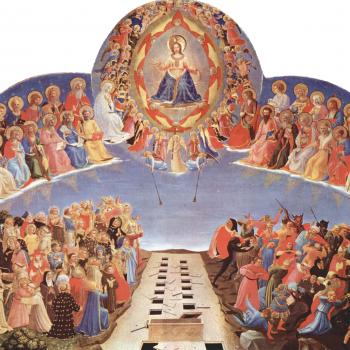On Good Friday we remember that God subjected himself to the evil of humanity, and what that evil looked like when it was placed upon him. We recall that somehow, in a way not fully understood by us, this voluntary self-sacrifice by the Creator and Sustainer of the universe made possible a reconciliation between him and the humanity that manifested its rejection of him by the torture and degradation it inflicted upon him. It is of the essence of the Christian faith that we maintain within ourselves the sobering disquiet of the realization that we were all present and participating in the brutal flagellation, the savage driving of the nails, and the heartless mockery. So deep and intense was our evil that concentrated upon him that day that the sun itself was made dark, and we were made to look plainly at the grim and stark reality of what we had become.
No one can fully understand his need for repentance until he has come to grips with his own culpability for the events of Good Friday. No one understands the reason for the Crucifixion until he realizes that it was our nature, not God’s, that made the bloody sacrifice necessary; that it was we, not him, who thirsted for the torture and death of the God whose love was so absolute and unconditional that he submitted to our will in order to be reconciled to us.
In light of these things it seems almost beside the point to consider the legal and political reasons behind the Crucifixion, which seem at first blush to be merely incidental. But they are not incidental. For it was the very fact that such reasons were possible that made the Crucifixion necessary in the first place.

First century Palestine had governments, like most places, and was under occupation, like many places before and since. Jesus’ native Galilee was governed by Herod Antipas, a puppet of the Roman Empire. Judea, where Jesus was killed, was under direct Roman rule, such jurisdiction that the high priests and Sanhedrin had being entirely at Roman sufferance.
Roman rule was brutal, taxation was harsh, and any resistance was met with one of the cruelest methods of execution ever devised. Into this situation Jesus came proclaiming the kingdom of God, something that was to come inevitably at the end of the world, to be sure, but also something that could be experienced here and now by those willing to drop the pretenses of the present age.
It was for this he was killed. He offered an alternative, God’s alternative, to the brutality of the prevailing system. He offered God as king in a society that could tolerate no other king but Caesar. He showed people that their participation in the system could be remedied by something as simple as the cessation of that participation. And so he was sentenced to the execution of a rebel, for a rebel he truly was, of the deepest and most significant kind.
In our own time, and in our own nation, some of us enjoy the fruits of empire, much as the Roman citizens did when Jesus walked the earth. Others of us fare little better than those who have groaned under our export of war and the falsely called “free enterprise.” We are at constant war with each other and with those abroad. We cut food stamps for the needy, and bomb villages in the Middle East. We allow unconscionable employers to pay wages lower than what is needed to support a family. We are so addicted to our own pleasures that we slay our own offspring if any result, comforting ourselves that we have done so before birth, and calling our action by the euphemism “abortion.” And we are arrogant enough to claim that it is our right to do such things, twisting and distorting the idea of natural rights beyond recognition.
 Henry David Thoreau refused to pay the poll tax because of his objection to slavery, and was arrested as a result. It is said that Ralph Waldo Emerson came to see him in jail, and asked, “Henry, what are you doing in there?” Thoreau’s pointed response was, “Waldo, what are you doing out there?”
Henry David Thoreau refused to pay the poll tax because of his objection to slavery, and was arrested as a result. It is said that Ralph Waldo Emerson came to see him in jail, and asked, “Henry, what are you doing in there?” Thoreau’s pointed response was, “Waldo, what are you doing out there?”
Here in these United States we Christians don’t suffer persecution as did those who lived in the Islamic State, those who marched with Dr. Martin Luther King, Jr., or those many martyrs who have gone before us back to the Apostolic age. Indeed, many of us enjoy the comforts of respectability and prosperity. And yet it is an open question as to what difference we are making to a society that engages in the evils aforementioned. Indeed, some of us who take the name of Christian actively embrace those evils. In light of this, we must ask ourselves if the reason we do not suffer persecution in such a system is because we present no threat to it, and, if so, why that is the case.
Perhaps, this Good Friday, we will reflect on our participation in the Crucifixion. And perhaps we will reflect on the reasons why Jesus was crucified. Perhaps further, we will look up to Jesus on the Cross and ask him, “What are you doing up there?” And, perhaps, Jesus will look down upon us and ask, “What are you doing down there?”
The icon of St. Joseph the Worker is by Daniel Nichols.
Please go like Christian Democracy on Facebook here. Join the discussion on Catholic social teaching here.
An earlier version of this article appeared in the pre-Patheos version of Christian Democracy on March 25, 2016.












